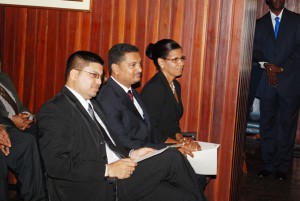Three new High Court judges were sworn in before President Donald Ramotar at the Office of the President on Monday. The president urged the new judges to execute their duties efficiently and to ensure that justice is served swiftly.
The newly appointed judges are Nareshwar Harnanan, Navindra Singh, and Sandra Kurtzious. Harnanan, a former deputy solicitor general, had worked at the Attorney General’s Chambers and Legal Affairs Ministry for the past 11 years, rising through the ranks from a state counsel position. He is a graduate of the University of Nottingham, Hugh Wooding Law School, and the University of the West Indies.
Singh is a founding partner of two law firms, and a graduate of the Hugh Wooding Law School, the University of Guyana, and Saint John’s University.
Kurtzious has been a partner at the Kurtzious, Waldron & Burchsmith Law Firm for several years and served as president of the Guyana Association of Women Lawyers. In brief comments to the Government Information Agency (GINA), each of the judges vowed to serve the people to the best of their ability with efficiency and impartiality. The head of state said he has been hearing about the shortage of judges which has been causing trials, and hence, justice to be delayed.
“I do hope with your appointment – it will go a far way in reducing the backlog … persons would have their cases heard on time, because I strongly believe in the saying “Justice delayed is justice denied”; and I can look forward to hard work and that persons have their cases heard and that they don’t wait for a long time because that is an issue,” Ramotar stressed.
Full complement of judges




